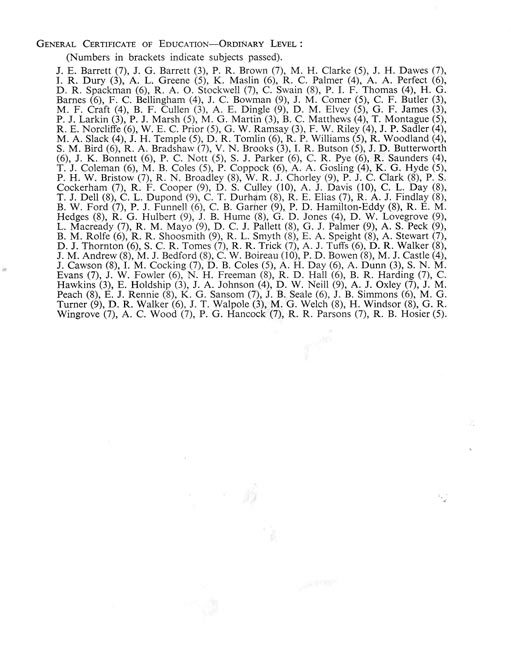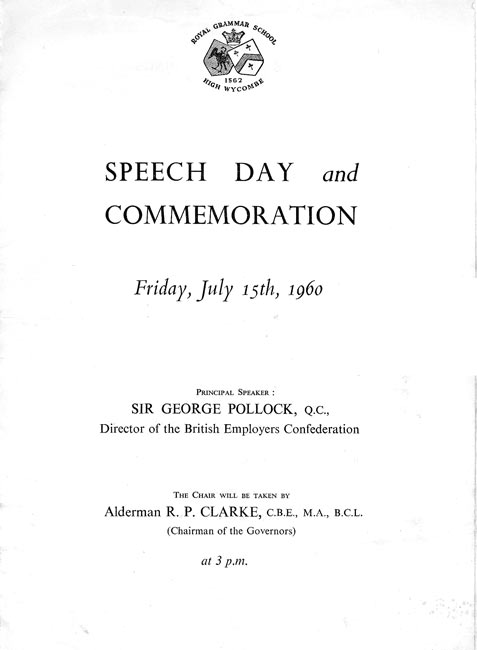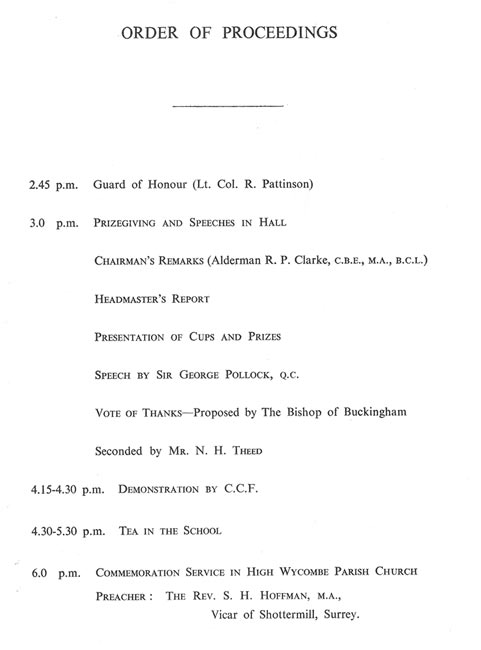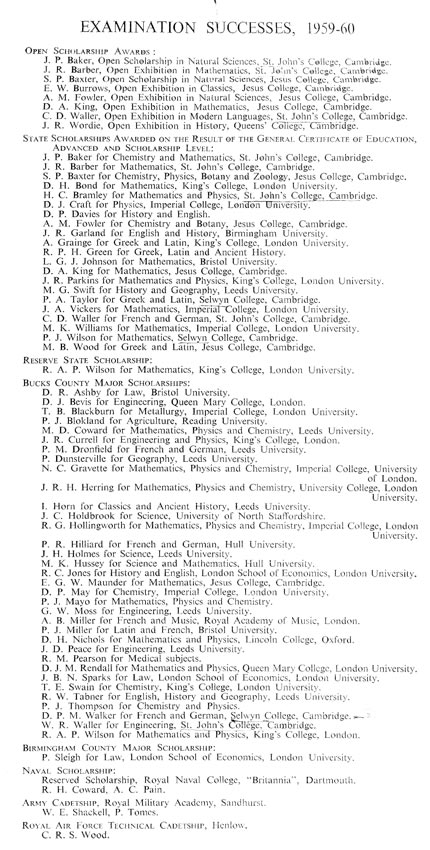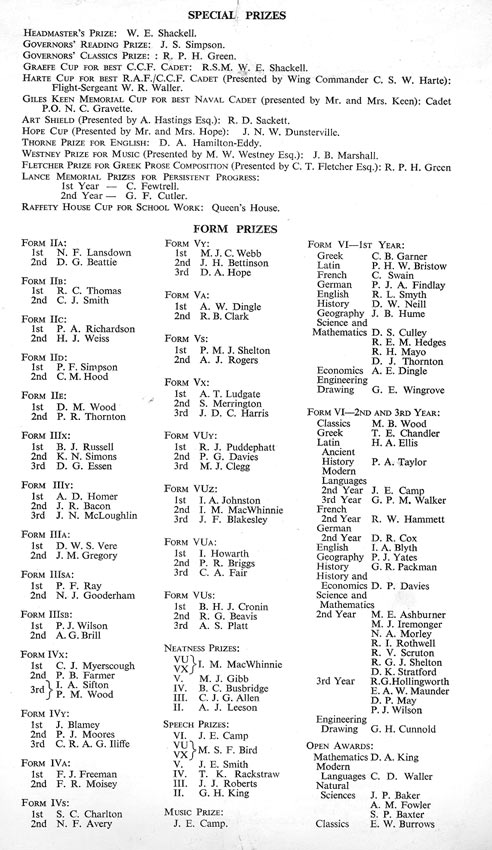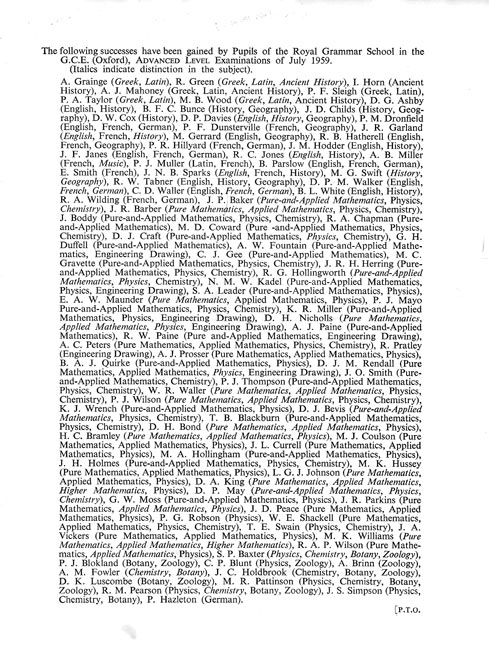
ROYAL GRAMMAR SCHOOL, HIGH WYCOMBE
SPEECH DAY PROGRAMME FOR 1960
(Various torn/scribbled-on pages have had to be digitally repaired)
Other Speech Day Programmes
SPEECH DAY 1960The C.C.F. Guard of Honour and band presented themselves with the smartness and efficiency which by now is a well-established Speech Day tradition. After a brief inspection by Sir George Pollock, Q.C., the guests and parents assembled in the Hall for the main function of the afternoon. After opening the proceedings by welcoming the guest speaker, Sir George Pollock, Q.C., Alderman R. P. Clarke made a cursory survey of the year’s events. He noted that more scholastic successes had been gained than ever before in the history of the School, and commented on the completion of the new Science School; this, by making available an old chemistry laboratory, which could be suitably converted, had made possible the Headmaster’s long ambition of a School Chapel. After welcoming Sir George and Lady Pollock and the Mayor and Mayoress, the Headmaster began his Annual Report. It had been a very busy year, he said: not only had the Laboratory Block been completed, but plans had already been passed for the addition of a great new Hall at the front of the School, a new Teaching Block and Staff accommodation on the right-hand side, the whole of which was to be joined up by cloisters, thus completing a quadrangle, rather on college lines. The plans also included the provision of a Swimming Bath, and in this connection the Headmaster wished to thank the warm response to the appeal for contributions by Old Boys and parents; with contributions already promised the project was assured and work would begin by mid-1961. Meanwhile the conversion of the old Chemistry Laboratory into a Chapel was near to being realised. Spontaneous offers of help after the Old Boys’ Annual Dinner in 1959, when the idea was first voiced had been overwhelming; further contributions would, however, be most welcome. Of great significance was the departure of six of the Staff, particularly Mr. L. J. Ashford, the Senior History Master, and Mr. A. L. Runswick, the House Tutor at School House. Referring to the Staff, the Headmaster said that Mr. S. Morgan had now completed his thirtieth year of full service. In reviewing the year’s academic achievements he noted that only two other schools could exceed the twenty-one State Scholarships awarded to the School. It was heartening at a time when competition for even places at Oxford and Cambridge was fierce, that the School should retain its close connection with Jesus College, Cambridge, from which four of the eight Open Awards gained by the School had come. Entrance to University for the year had increased by twenty-five per cent and the School had gained a much bigger than usual number of Cadetships to the Service Colleges. Four people had gained Flying Scholarships and were in the process of gaining their wings. However, the Headmaster did not think that the School had yet reached its peak in growth or distinction. Such a record of achievement was very greatly due to the excellent quality of the Staff. The only real criticism the Headmaster had to make in the academic field was that some boys failed to match their work at School with the same standard of devotion at University. In another sphere, Mr. Cooke was retiring as Chief Education Officer of the County, and the Headmaster paid especial tribute to his wisdom and determination in supporting the School’s efforts and ambitions. It was therefore fitting that he had invited him to be the School’s special guest at the next Speech Day. Meantime other School activities had continued much as usual. The Headmaster did, however, regret the poor response of parents to invitations to attend the opera and concerts, though he felt sure that the boys were in part responsible. He ended by paying tribute to Mr. L. Jennings, who after twenty years as Head Caretaker was retiring. After presenting the cups and prizes, Sir George Pollock rose to make his speech. He spoke of the Headmaster as a dedicated man to whom the School owed much. Of prospects in industry Sir George reflected that Britain was still essentially virile and progressive and that opportunities for men holding high engineering degrees were boundless; but despite this, it was the average boy with common sense who formed the sure foundation of society. Beside the demands of industry, however, was the greater need for those moral and spiritual qualities in youth which were so necessary to the modern world. A vote of thanks was proposed by the Bishop of Buckingham, and seconded by Mr. N. Theed. After tea in the School the new Science School became the centre of attraction to many parents and guests. Later the Commemoration Service was held in the Parish Church. The service was conducted by the Vicar, the Reverend A. L. Evan Hopkins, and the sermon was preached by the Reverend S. Hoffman, an Old Boy of the School. |
